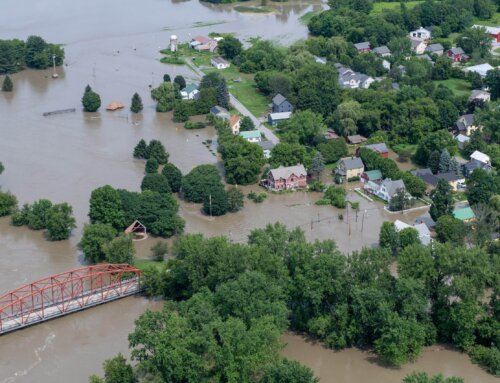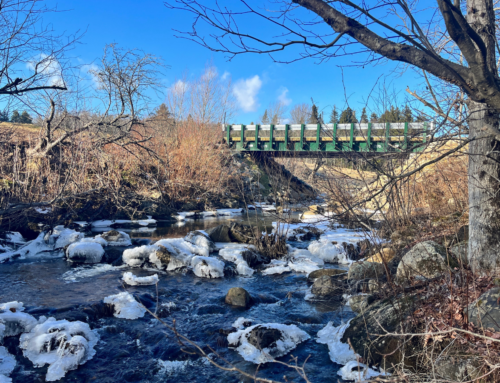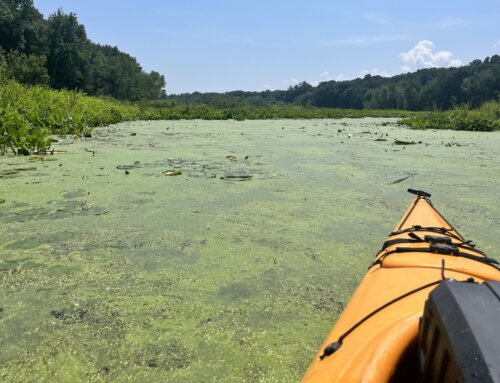Greenfield, MA— The 410+ mile long Connecticut River and nearby rivers and streams are cleaner of trash thanks to thousands of hard working volunteers. On Friday & Saturday, September 25 & 26, volunteers from businesses, faith communities, watershed groups, schools, community and youth organizations grabbed trash bags and work gloves for the 19th annual Source to Sea Cleanup, organized by the Connecticut River Watershed Council (CRC). The Source to Sea Cleanup is a two-day collaborative trash clean-up event in all four states of the Connecticut River basin (NH, VT, MA, CT).
In addition to the tons of trash removed this year by volunteers, CRC uses the Source to Sea Cleanup as an opportunity to clean up large trash dump sites and remove large debris items from our rivers. This year, CRC partnered with LANE Construction, Eversource and volunteers from the Green River Cleanup in Greenfield, MA to remove about 1,000 tires from a tire dump along the Deerfield River, a tributary of the CT River. CRC plans to return to this area to continue removing tires from this massive dump. In Springfield, VT CRC partnered with H&B Energy Solutions to remove and recycle an engine block from the CT River. In Hadley, MA CRC worked with the MA Environmental Police and the City of Northampton to remove an illegal and decrepit dock on the CT River shore. Unusual items found this year include a wheelchair in Westfield, MA, a pellet handgun in East Hartford, CT and an air rifle in Northampton, MA —both guns were reported to local police for proper disposal.
Final numbers are still being tallied, but it’s estimated that 2,000-2,500 volunteers participated in this year’s event, including over 30 corporate and business employee service groups. Volunteers cleaned rivers from Colebrook, NH near the Canadian border down to the mouth of the Connecticut River in Old Lyme, CT. On average, 40-50 tons of trash is removed from in and near our rivers every year. “The Source to Sea Cleanup is about strengthening community and allowing people to take meaningful action to improve their neighborhoods,” says Alicea Charamut, CRC’s Cleanup Coordinator. “When people help clean their rivers, they make connections with each other and their rivers. Those connections have benefits lasting well beyond the Cleanup.”
“Our goal is to keep trash and tires from getting in our rivers in the first place and to eventually put ourselves out of the business of cleaning up our rivers” notes Charamut. “In addition to coordinating volunteers to clean up trash, CRC also collects data from Cleanup groups about the amount and types of trash they find. This data supports year-round advocacy efforts and informs policies and legislation that will keep waste out of our rivers.”
CRC is working with river states on establishing extended producer responsibility (EPR) systems that hold producers responsible for free and easy disposal by consumers of items like tires, paint cans and appliances. In Vermont, CRC helped create and pass legislation forming the Scrap Tire Management Stakeholder Group, tasked with addressing “legacy” scrap tire piles and reducing persistent improper scrap tire disposal. CRC will remain involved with the Group, which will make recommendations for legislative efforts in the coming year. CRC also supports phasing out and finding replacements for Styrofoam products—especially Styrofoam dock supports, in favor of enclosed foam or non-foam dock materials—as well as reducing the use of and increasing the recycling of plastic bottles and plastic bags.
“We all have a responsibility to solve this problem—individuals, manufacturers, businesses, and government,” says Andrew Fisk, CRC Executive Director. “Lead sponsors NRG Middletown, Pratt & Whitney, and TransCanada’s financial support enables us to continue growing the Source to Sea Cleanup so that it has an impact beyond the two days of clean up.”
The Connecticut River Watershed Council works to protect the watershed from source to sea. As stewards of this heritage, we celebrate our four-state treasure and collaborate, educate, organize, restore and intervene to preserve its health for generations to come. Our work informs our vision of economic and ecological abundance. To learn more about CRC, or to make a contribution to help protect the Connecticut River, visit ctriver.org or call 413-772-2020, ext. 201.
###







